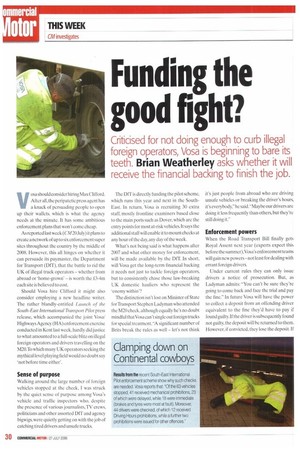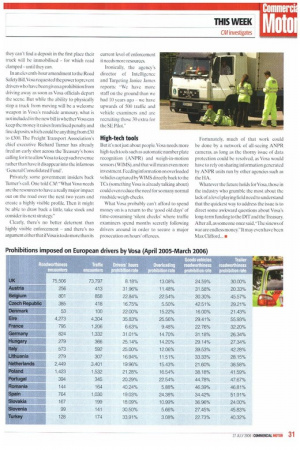Funding the good fight?
Page 30

Page 31

If you've noticed an error in this article please click here to report it so we can fix it.
Criticised for not doing enough to curb illegal foreign operators, Vosa is beginning to bare its
teeth. Brian Weatherley asks whether it will receive the financial backing to finish the job.
Vosa should consider hiring Max Clifford. After all, the peripatetic press agent has a knack of persuading people to open up their wallets, which is what the agency needs at the minute. It has some ambitious enforcement plans that won't come cheap.
As reported last week (CM 20July) it plans to create a network of up to six enforcement super sites throughout the country by the middle of 2008. However, this all hinges on whether it can persuade its paymaster, the Department for Transport (DfT), that the battle to rid the UK of illegal truck operators — whether from abroad or 'home-grown' — is worth the £3-4m each site is believed to cost.
Should Vosa hire Clifford it might also consider employing a new headline writer. The rather blandly-entitled Launch of the South-East International Transport Pilot press release, which accompanied the joint Vosa/ Highways Agency (HA) enforcement exercise conducted in Kent last week, hardly did justice to what amounted to a full-scale blitz on illegal foreign operators and drivers travelling on the M20.To which many UK operators seeking the mythical level playing field would no doubt say `not before time either'.
Sense of purpose
Walking around the large number of foreign vehicles stopped at the check, I was struck by the quiet sense of purpose among Vosa's vehicle and traffic inspectors who, despite the presence of various journalists, TV crews, politicians and other assorted Df I' and agency bigwigs, were quietly getting on with the job of catching tired drivers and unsafe trucks. The DfT is directly funding the pilot scheme, which runs this year and next in the SouthEast. In return. Vosa is recruiting 30 extra staff, mostly frontline examiners based close to the main ports such as Dover, which are the entry points for most at-risk vehicles. It says the additional staff will enable it to mount checks at any hour of the day, any day of the week.
What's not being said is what happens after 2007 and what other money for enforcement, will be made available by the MT. In short, will Vosa get the long-term financial backing it needs not just to tackle foreign operators, but to consistently chase those law-breaking UK domestic hauliers who represent the 'enemy within*?
The distinction isn't lost on Minister of State for Transport Stephen Ladyman who attended the M20 cheek, although equally he's no doubt mindful that Vosa can't single out foreign trucks for special treatment. 'A significant number of Brits break the rules as well — let's not think it's just people from abroad who are driving unsafe vehicles or breaking the driver's hours, it's everybody," he said."Maybe our drivers are doing it less frequently than others, but they're still doing it."
Enforcement powers
When the Road Transport Bill finally gets Royal Assent next year (experts expect this before the summer),Vosa's enforcement teams will gain new powers—not least for dealing with errant foreign drivers.
Under current rules they can only issue drivers a notice of prosecution. But, as Ladyman admits: "You can't be sure they're going to come back and face the trial and pay the fine." In future Vosa will have the power to collect a deposit from an offending driver equivalent to the fine they'd have to pay if found guilty. If the driver is subsequently found not guilty, the deposit will be returned to them. However, if convicted, they lose the deposit. If they can't find a deposit in the first place their truck will he immobilised for which read clamped until they can.
In an eleventh-hour amendment to the Road Safety Bill. Vosa requested the power to prevent drivers who have been given a prohibition from driving away as soon as Vosa officials depart the scene. But while the ability to physically stop a truck from moving will be a welcome weapon in Vosa's roadside armoury, what is not included in the new bill is whether Vosa can keep the money it raises from fixed penalty and fine deposits, which could be anything from £30 to £300. The Freight Transport Association's chief executive Richard Turner has already fired an early shot across the Treasury's bows calling for it to allow Vosa to keep such revenue rather than have it disappear into the infamous 'General Consolidated Fund'.
Privately, some government insiders back Turner's call. One told CM: "What Vosa needs are the resources to have a really major impact out on the road over the next two years and create a highly visible profile. Then it might be able to draw back a little, take stock and consider its next strategy."
Clearly, there's no better deterrent than highly visible enforcement and there's no argument either that if Vosa is to do more than its current level of enforcement it needs more resources.
Ironically, the agency's director of Intelligence and Targeting Janice James reports: "We have more staff on the ground than we had 10 years ago we have upwards of 500 traffic and vehicle examiners and are recruiting those 30 extra for the SE Pilot."
High-tech tools
But it's not just about people. Vosa needs more high-tech tools such as automatic number plate recognition (ANPR) and weigh-in-motion sensors (W1MS), and that will mean even more investment. Feedinginformation on overloaded vehicles captured by WIMS directly back to the TCs (something Vosa is already talking about) could even reduce the need for so many normal roadside weigh-checks.
What Vosa probably can't afford to spend money on is a return to the 'good old days' of time-consuming 'silent checks' where traffic examiners spend months secretly following drivers around in order to secure a major prosecution on hours offences. Fortunately, much of that work could be done by a network of all-seeing ANPR cameras, as long as the thorny issue of data protection could be resolved, as Vosa would have to rely on sharing information generated by ANPR units run by other agencies such as the HA.
Whatever the future holds for Vasa, those in the industry who grumble the most about the lack of a level playing field need to understand that the quickest way to address the issue is to direct some awkward questions about Vosa's long-term funding to the DfT and the Treasury. After all, as someone once said, "The sinews of war are endless money." It may even have been Max Clifford...•
























































































































































































